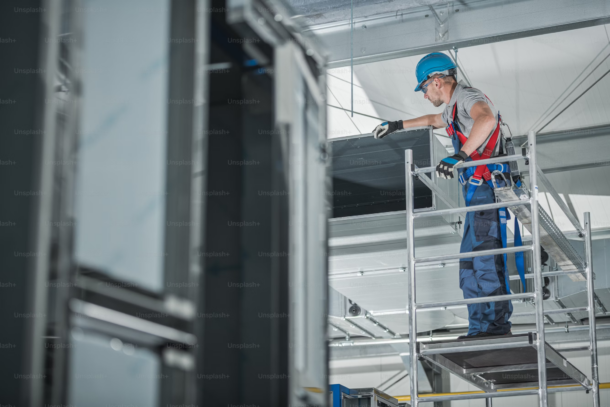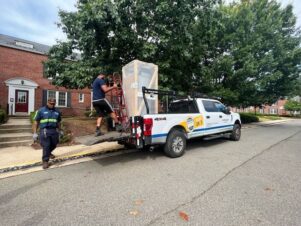Poor indoor air quality can adversely affect your business. Not only will employees experience discomfort and/or become ill, but the same kinds of things will also affect your customers. Neither of these will be good for your business. Additionally, having dirty and/or clogged ducts could cost you more money on your heating bills and cause you to run afoul of building inspectors. It’s easy enough to have your ducts cleaned by a professional HVAC company.

Indoor Air Quality
This information applies to residential air ducts, but the same principles also apply to businesses. Really, the only difference is the scale of the system. Commercial HVAC still has compressors, coils, and ducts even if they’re larger than their residential counterparts.
The chief problem that occurs with dirty ducts is that biological contaminants can grow inside the ducts, particularly if there is standing water in them for whatever reason. These contaminants thrive in moist conditions, producing spores and attracting allergens. Another kind of biological contaminant is when a critter gets trapped inside the air ducts and dies. In addition to already-mentioned contaminants, the remains can also deposit bacteria and viruses into the HVAC system. These could be diseases the animal carried in life but also diseases that form after the animal’s death.
In addition to the biological contaminants, especially in commercial systems, there could be volatile organic compounds that waft into the system. These include things like methalyne chloride, formaldehyde, benzene, toluene, and stryene among others. When ducts are dirty and/or clogged, these vapors can attach themselves to the airborne particulates and also the dirt attached to the duct walls. Additionally, if the ducts aren’t clean, then they won’t be able to circulate the air correctly. The dirty ducts can also lead to overtaxed filters, which could wind up not removing either the biological contaminants or the volatile organic compounds.
The Effect on Your Energy Bill
Overtaxed HVAC systems use more energy than normal. You should keep an eye on your energy bills, and look out for statistically significant jumps in power usage and/or cost. Minor changes, such as those brought on by a heat wave in summer or cold snap in winter, aren’t what to look out for. A sudden jump of 25% or more indicates a serious problem. Also, if more employees than normal are calling in sick, or you receive phone calls from customers who have taken ill, then that’s also an indication, particularly if you also notice a spike in your energy bills.
No DIY
Even more than in the case of residential HVAC, it’s imperative that you not try to handle your company’s dirty-duct problem yourself. Not only could it be unsafe for you to do so, it could also wind up being much more expensive than calling a professional if you break something or perform any DIY repairs incorrectly. Worse, incorrect repairs might not be up-to-code, which could result in fines and/or lawsuits, depending on the severity of the problems you might cause by trying to DIY.




Join the conversation: